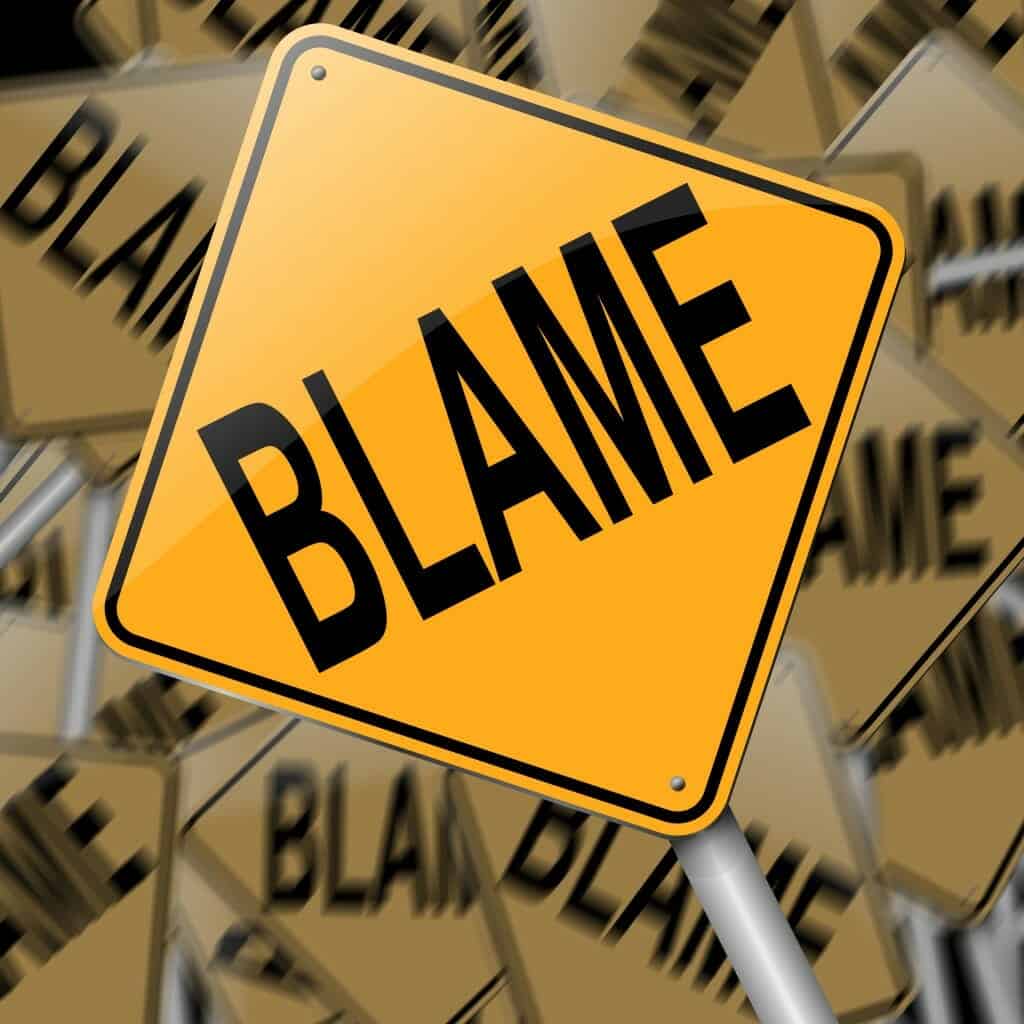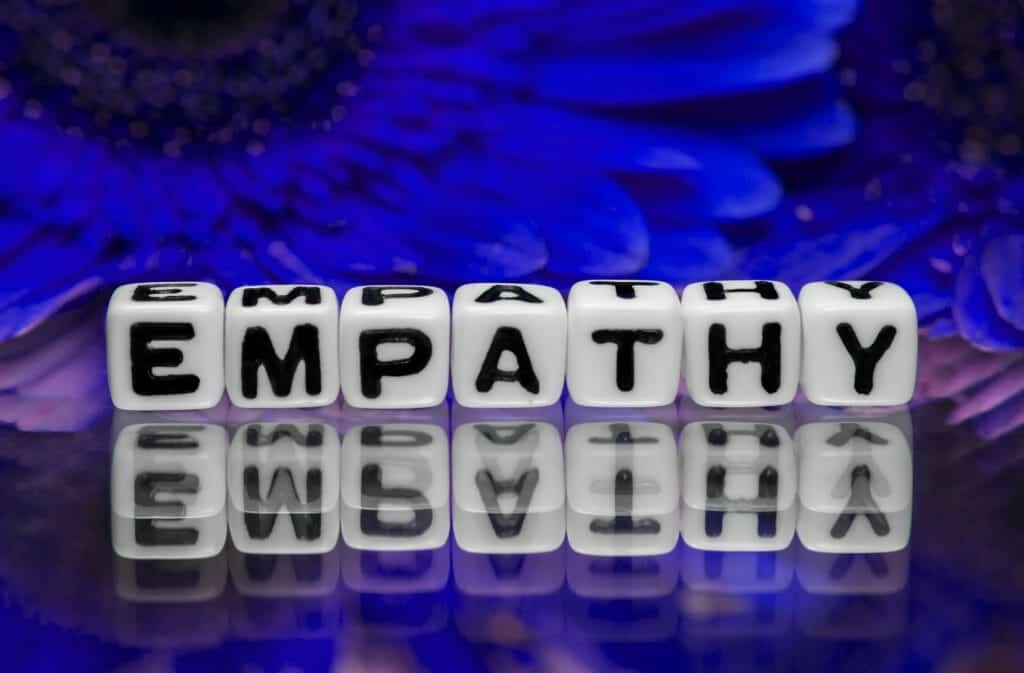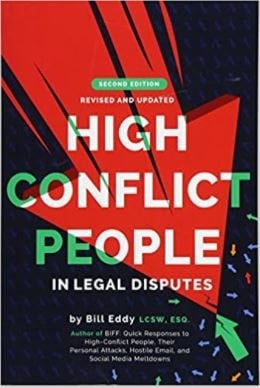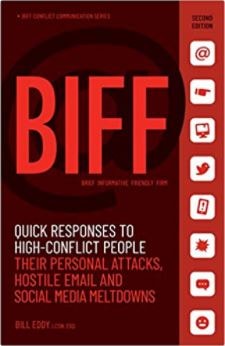
What do you do when someone verbally attacks you for no apparent reason? What do you do when someone overreacts to the smallest perceived slight – even when you didn’t mean to offend them? How do you handle the critical, angry, and overall bad behavior of high conflict people?
It’s not easy.
What is a High Conflict Person?
A high conflict person is one whose behavior escalates conflict, rather than calms it.
High conflict people tend to be critical, attacking, self-absorbed, and rigid. What’s more, they appear to thrive on conflict. Because of that, their lives, and their relationships, tend to be full of drama.
A high conflict person may also be a narcissist or have another kind of personality disorder. But, even people without personality disorders can be high conflict people.
Dealing with high conflict people can be nerve-wracking. You often feel like you need to walk on eggshells around them. You never know when they’re going to explode.
Going through a divorce with a high conflict person takes the word “conflict” to a whole new level. Suddenly the drama you used to have to deal with while you were married will look absolutely Zen compared to what you experience during your divorce.
That’s part of what makes divorcing a high conflict spouse so agonizing.
[amp-optin id=11936]
Characteristics of a High Conflict Spouse
If you have a high conflict spouse s/he will blame you for all of his/her problems. For a while (maybe a long time!) you will think YOU are the problem. But if you look closely at your spouse’s other relationships, you will probably find that your high conflict spouse experiences a lot of problems with other people, too.
It’s not just you.
A high conflict spouse has four primary characteristics:
1. S/he has a lot of un-managed emotions.
S/he has intense anger, fear, hysteria, disrespect etc. These emotions often surprise others and seem way overblown for the situation at hand.
2. S/he is prone to black and white thinking.
Everything is all bad or all good. There is no grey.
3. S/he exhibits a lot of extreme behaviors.
This may include physical violence, but also includes behaviors such as out-of-control yelling, obsessively contacting or stalking someone, or completely and totally ignoring someone.

4. S/he blames others for everything.
A high conflict person does not take responsibility for his/her part in any conflict or misunderstanding. S/he attacks and blames someone else with the intensity of someone whose life is on the line.
Do You Have a High Conflict Spouse?
If you have a high conflict spouse chances are, you know it!
You may not have known that there was a label for your spouse’s behavior. But you have probably known for a long time that your spouse’s behavior was different, more emotional and intense, than other people’s behavior.
The problem with having a high conflict spouse is that, once you have finally had enough and decide to divorce them (or they decide to divorce you – it really doesn’t matter because it will be all your fault anyway) their already horrible behavior only gets worse.
If you thought they were manipulative, angry, critical, rigid, deceitful, self-absorbed, self-sabotaging and maybe even violent, while you were married you can only imagine what their behavior is going to be like when you start divorce! (Sorry!)
Here are some tips that will help you deal with your spouse more effectively.
3 Tips for Handling a High Conflict Spouse

Tip #1: Don’t Take it Personally.
The first thing to remember when a high conflict person (or a narcissist) goes off on you is that whatever s/he is going crazy over has nothing to do with you. It is really all about them.
(In truth, pretty much everything a high conflict person says or does is about them. That’s a big part of the problem.)
High conflict people are so self-absorbed that they can’t see the effect that their behavior has on anyone else. All they see is themself. Everything they say and do is, quite literally, about them.
Of course, it’s hard not to take someone else’s bad behavior personally – especially when it is directed at you!
Trust me. I get it.
From time to time, people respond to things that I write with, shall I say, something less than positive intent. For example, one recent comment I got started with “I’m here to call bullshit on the whole charade.” (And that was just the first sentence!)
Now, I have to admit, when I first read that comment, my stomach clenched. Not only did I feel like the reader was personally attacking me, but I have to tell you that I was not feeling particularly positive myself in that moment.
Naturally, the lawyer in me wanted to verbally lash back – hard! But, my experience working with people going through divorce has taught me that the person who wrote that comment is actually in a lot of pain.
As hurtful as it may have been for me to read that comment, it actually had nothing to do with me. The comment was a reflection of the writer’s pain and problems. Taking that comment personally would have been the worst thing for me to do.

Tip #2: Lend High Conflict People an E.A.R.
E.A.R. stands for Empathy, Attention, and Respect.
High conflict people are not necessarily bad people. They are hurt and defensive. If you listen and respond to high conflict people with empathy, attention, and respect, you may be surprised at how quickly you can minimize drama and avoid a full-blown war.
While the last thing you probably feel like doing when someone has just lied to you, criticized you, or threatened you, is to listen to them with empathy, it is the most productive thing you can do if you don’t want to heighten the conflict.

The “E” in E.A.R. = Empathy
Empathy is different from sympathy.
When you listen with empathy to someone, you listen for the pain and frustration they are feeling. You connect with that pain and frustration on a human level. You have undoubtedly felt the same feelings yourself from time to time. Listening with empathy shows the person who is talking that you care.
Listening with sympathy, however, implies that you feel sorry for the person who is talking. You may pity them. That pity creates separation, rather than connection. You can feel sorry for someone even if you don’t care about them at all.
The “A” in E.A.R. stands for “Attention.”
High conflict people often feel ignored. They long for attention. That is one of the reasons that they get into so many conflicts in the first place. Giving them attention (while at the same time not reacting to their drama) can help neutralize a high conflict situation.
Of course, giving them attention doesn’t mean that you let them make you a punching bag for hours and hours. You do have to set limits. You don’t have to agree with everything they say, or listen to them forever. But if you can listen long enough for them to feel heard, they will usually start to calm down.

The “R” in E.A.R. means “Respect.”
Finally, high conflict people need respect. Because of their personalities, respect is something they are not used to getting from other people. They may get negative attention from their never-ending conflicts, but they rarely get respect.
While you may think that respecting a high conflict person is impossible, if you dig a little deeper and put your ego aside, you can probably find something in that person that you respect. Maybe you respect their ability to speak their mind. Maybe you respect how they stand up for themselves. Don’t focus on the fact that they are trying to smash you while they stand up for themselves. Do your best to be positive.
Tip # 3: Use BIFF Responses
Despite how they come across, high conflict people are really very frightened. They lack self-awareness and have difficulty changing their behavior. They also have problems accepting responsibility for their problems.
For all of these reasons, communicating with a high conflict person can be challenging. They may threaten and attack you, but if you threaten and attack them back, you only escalate the conflict. If you want to communicate with a high conflict person effectively, you need to take a different approach.
You need to use B.I.F.F.

The “B” in B.I.F.F. stands for “Brief.”
When a high conflict person (especially your high conflict spouse) sends you a hostile email, text, or other communication, the best way you can respond is to be brief, informative, friendly, and firm.
Keeping your response brief will reduce the chances that you will get dragged into a prolonged angry text or email exchange with a high conflict person. The less you write, the less material you give the other person to respond to.
Being brief will also require you to avoid counter-attacking or criticizing the other person. (Obviously, doing either of those things will only cause more drama!)
[amp-optin id=11936]
The “I” in B.I.FF. stands for “Informative.”
Being informative means that you stick to the facts. Tell the other person what is necessary, but no more. Don’t share your opinions, or comment on the facts. Don’t give advice. Just convey the facts.
Being informative also means that you don’t spend a lot of time trying to defend yourself to the other person. When I was responding to the negative comment on my website, I responded by referring to research facts. Period. I didn’t go into a whole long explanation of how I was right and that person was wrong.
If anyone besides you and the high conflict person is going to see your response, then you will also want to use facts to correct any inaccurate statements that the high conflict person made. When you do that, though, remember to stick to the facts. Don’t throw your own sarcastic comments in with the facts, too.

The first “F” in B.I.F.F. is for “Friendly.”
Your response should be friendly. (Again, I know that ‘friendly’ is the last thing you probably feel like being.) Being sarcastic, threatening, or unpleasant will only intensify your conflict. Remember, if you react to high conflict people in anger, you will only trigger yet another angry response from them.
Being friendly doesn’t mean that you have to gush, or to pretend to feel something you don’t feel. You’re not trying to make the person your best friend. You’re just trying to be mature, civilized, and polite.
You will also want to avoid being sickly-sweet. No one, not even a high conflict person, likes to be patronized.
The final “F” in B.I.F.F. stands for “Firm.”
Being firm means that you set limits in a confident, non-threatening way. If you need information from the other person by a certain date, tell them that. But, don’t turn the deadline into an ultimatum. Simply state the deadline and move on.
Being firm also means not asking open-ended questions when you want to avoid getting into a back-and-forth dialogue. If you need additional information, then go ahead and ask for it. Otherwise, politely end your correspondence once you’ve conveyed whatever information you need to convey.

The Challenge of Dealing With High Conflict People
Effectively dealing with high conflict people takes an enormous amount of self-control. Unpleasant, demanding, and unreasonable people are not fun to deal with. Even when you are a professional, a high conflict person can still push your buttons.
If you happen to be going through a divorce, and the high conflict person you are dealing with is your spouse, you are even more likely to have a tough time managing your emotions when you deal with him or her. But, just as with any skill, practice will improve your performance.
Practice listening to your high conflict spouse with E.A.R. Practice using B.I.F.F. responses whenever you can. (HINT: It’s much easier to do this when you are corresponding in writing, via text or email. Being able to come up with a B.I.F.F. response in the middle of a conversation takes a lot of practice.)
While you may never get to the point where you enjoy dealing with high conflict people, you may get to the point where you can minimize the drama. When you do, your life, like mine, will become a whole lot easier.
________
This article is based on the work of lawyer, therapist, and mediator, Bill Eddy, Founder of The High Conflict Institute. If you are divorcing a high conflict spouse, check out Bill’s Books.
______________
This post was originally written on November 22, 2016 and updated on July 3, 2020.
[amp-optin id=11936]




Excellent summary. This reminds me of the book “Splitting” which was very helpful to me in my high-conflict divorce from a woman with borderline personality disorder tendencies.
Splitting is a great book! It’s co-authored by Bill Eddy, who also wrote: High Conflict People in Legal Disputes and BIFF Here is an amazon link to the book: http://amzn.to/2iFARvS.
Hey karen
My hubby is cheating me and wants a divorce and I got the papers
If you’ve already been served with divorce papers, you need to talk to a good divorce lawyer in your area as soon as possible. You need to understand what you are facing, and what your options are moving forward. Since the court has deadlines, it is important that you consult with a lawyer soon so that you don’t miss whatever deadline you may be facing.
Karen